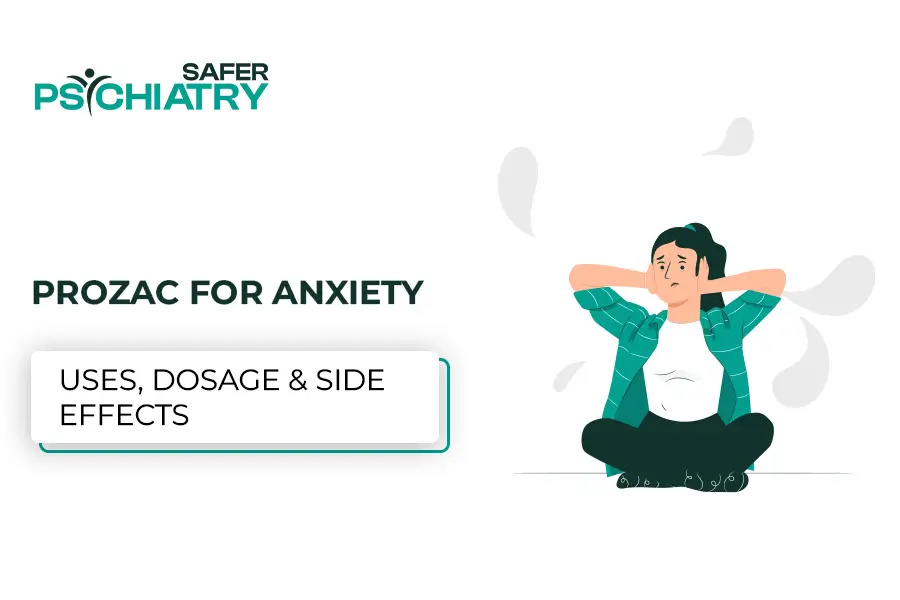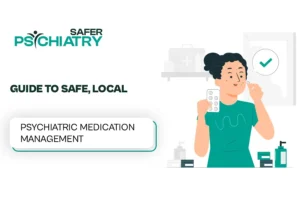
Prozac for Anxiety - Usage, Dosage
and How It Works
At Safer Psychiatry, we provide compassionate, evidence – based mental health care to support your well-being now and for the future – because your journey matters, and so do you.

- Prozac, known generically as fluoxetine, belongs to a group of antidepressants called selective serotonin reuptake inhibitors (SSRIs).
- It balances serotonin levels, improving mood and reducing anxious thoughts.
- Typical dosage: 20–40 mg/day, with effects seen in 4–8 weeks.
- Safe for long-term use but requires medical supervision.
- Not every patient responds the same, treatment should be personalized.
Feel the nervous before a big test or life adjustment is normal. But when anxiety becomes continuous and interferes with daily activities, it can signal an anxiety disorder. Anxiety disorders disturb nearly 31% of adults in the U.S., making them one of the most common mental health challenges. Fortunately, modern treatments, including therapy and medications like Prozac, offer relief.
Prozac for anxiety is one of the most frequently prescribed approaches by psychiatrists. As a selective serotonin reuptake inhibitor (SSRI), Prozac helps regulate brain chemistry, reduce persistent anxious thoughts, and restore emotional balance.
What Is Prozac?
Prozac is the brand name for fluoxetine, a medicine in the SSRI class. It was first approved by the FDA in 1987 and quickly became one of the most prescribed antidepressants worldwide.
Medications in the SSRI category, including Prozac, function by boosting serotonin, a brain chemical that regulates mood, sleep patterns, and emotional well-being. People with low serotonin levels may experience symptoms of depression and anxiety, and Prozac helps by blocking serotonin reabsorption in the brain, ensuring more of it is available to improve mood and reduce stress.
What Conditions Does Prozac Treat?
Although commonly recognized as an antidepressant, Prozac has FDA approval for several mental health conditions:
- Major Depressive Disorder (MDD)
- Obsessive-Compulsive Disorder (OCD)
- Panic Disorder
- Bulimia Nervosa
Additionally, doctors often prescribe Prozac off-label for:
- Generalized Anxiety Disorder (GAD)
- Social Anxiety Disorder
- Post-Traumatic Stress Disorder (PTSD)
- Premenstrual Dysphoric Disorder (PMDD)
- Binge Eating Disorder
- Body Dysmorphic Disorder
This versatility makes Prozac an important option in mental health treatment plans.
Prozac for Anxiety - How Effective Is It?
For individuals with anxiety, Prozac is often prescribed to ease both emotional symptoms like worry and physical symptoms such as tension or restlessness. By raising serotonin levels, it balances communication between neurons, making it easier for the brain to manage stress and regulate mood.
Clinical studies have shown that Prozac:
- Decreases restlessness and excessive worrying.
- Reduces the frequency of panic attacks.
- Improves sleep and energy levels.
- Enhances overall quality of life when combined with therapy.
Prozac is frequently recommended as a first-choice treatment option for patients with anxiety disorders.
Prozac Dosage for Anxiety
The correct dosage depends on your health profile, severity of symptoms, and how your body responds.
- Typical starting dose: 10–20 mg once daily.
- Common therapeutic range: 20–40 mg daily.
- Maximum dosage: The highest approved dosage can reach 80 mg per day, but only under a doctor’s careful supervision.
- Prozac has a relatively long half-life, meaning it remains active in the body longer compared to many other SSRIs. This means it has a lower risk of withdrawal effects if a dose is missed.
How Lengthy Does Prozac Take to Work for Anxiety?
Unlike fast-acting medications, Prozac needs time to adjust brain chemistry.
- Week 1–2: Some people notice improved sleep or energy.
- Week 3–4: Anxiety symptoms begin to ease.
- Week 6–8: Full therapeutic effect becomes noticeable.
If you don’t experience improvements after 8–10 weeks, your doctor may adjust the dosage or suggest an alternative medication.
Common Side Effects of Prozac
While Prozac is generally well-tolerated, some people experience side effects, especially during the first few weeks.
Common side effects include:
- Nausea
- Insomnia or drowsiness
- Nervousness or restlessness
- Weight changes
- Sexual side effects
- Headache or dizziness
Maximum of these indications disappear as your body adjusts.
Serious Side Effects (Seek Medical Help Immediately)
Although rare, Prozac can cause serious issues:
- Suicidal thoughts (especially in young adults)
- Serotonin syndrome: agitation, rapid heartbeat, sweating, confusion
- Severe allergic reactions: swelling, rash, difficulty breathing
Never adjust your Prozac dose without consulting your doctor / Mental Health Specialist.
Prozac vs Other Anxiety Medications
Not every medication works the same for everyone. Here’s how Prozac compares with other common options:
Prozac vs Zoloft (Sertraline)
- Zoloft may take action earlier but has a shorter half-life.
- Prozac stays in the body longer, reducing withdrawal effects.
Prozac vs Lexapro (Escitalopram)
- Lexapro often causes fewer side effects.
- Prozac can be further real when anxiety and depression rise together.
Prozac vs Wellbutrin (Bupropion)
- Wellbutrin is not naturally recommended for anxiety, as it may worsen symptoms.
- Prozac is generally the better choice for anxiety management.
Special Considerations When Taking Prozac
Certain groups need additional caution when taking Prozac:
- Pregnancy: Prozac can be used but may pose risks in the third trimester (such as preterm delivery).
- Breastfeeding: Small amounts of fluoxetine can pass into breast milk and affect infants.
- Medical situations: People by liver disease, high blood pressure, or heart situations require monitoring.
- Drug interactions: Avoid combining with MAOIs, St. John’s Worth, or certain supplements without medical advice.
Benefits of Prozac for Anxiety
- Non-addictive and safe for long-term use.
- Long half-life → fewer withdrawal effects.
- Helps treat both anxiety and depression
- Supported by times of research and clinical use.
When to See a Doctor about Prozac
You should consult a doctor if:
- Your anxiety symptoms persist or worsen after 8 weeks.
- You experience troubling side effects.
- You’re with child, breastfeeding, or have a chronic health situation.
A psychiatrist can determine whether Prozac is the right choice or if another medication may suit you better.
Is Prozac Safe Long-Term?
Yes, Prozac is generally safe for long-term use when monitored by a psychiatrist. Because it has a long half-life, withdrawal symptoms are less intense compared to other SSRIs? Regular follow-ups ensure that side effects, mood stability, and overall health are monitored.
Final Thoughts
At Safer Psychiatry, our mission is to provide compassionate, evidence-based care for individuals living with anxiety. A psychiatrist can help you decide whether Prozac for anxiety is right for you, adjust your dosage if needed, and explore alternatives when appropriate. When paired with therapy and healthy coping strategies, Prozac can be a safe and effective part of your anxiety treatment plan, helping you achieve lasting relief and a better quality of life.
If you’re ready to start your journey toward improved mental well-being, Safer Psychiatry encourages you to book a consultation today. Our experienced team provides personalized guidance and support tailored to your unique needs.
Disclaimer: This content is intended for educational and informational purposes only. It should not replace professional medical advice, diagnosis, or treatment. Always speak with a qualified healthcare provider before starting, stopping, or adjusting any medication.
FAQ
Frequently Asked Questions
Is Prozac good for anxiety?
Yes, Prozac (fluoxetine) is commonly prescribed for generalized anxiety, panic disorder, and social anxiety. It helps by increasing serotonin in the brain.
How long ensures Prozac take to work for anxiety?
Most patients begin noticing improvements in 2–4 weeks, with full benefits usually seen within 6–12 weeks of consistent use.
What is the usual Prozac dosage for anxiety?
The starting dosage is often 10–20 mg daily. Many patients respond to 20–40 mg, while the Prozac max dose may go up to 80 mg under supervision.
What are the mutual side effects of Prozac?
Side effects of fluoxetine may include nausea, headaches, insomnia, nervousness, and sexual changes. Most are mild and improve with time.
What if Prozac is not at work for anxiety?
If Prozac isn’t effective after several weeks, a psychiatrist may adjust the dose, switch to another SSRI, or suggest alternatives to Prozac for anxiety.
Our Company
Copyright © 2024 Safer Psychiatric Consulting Services


